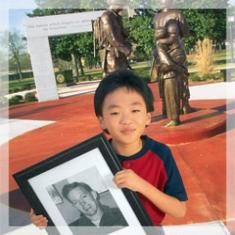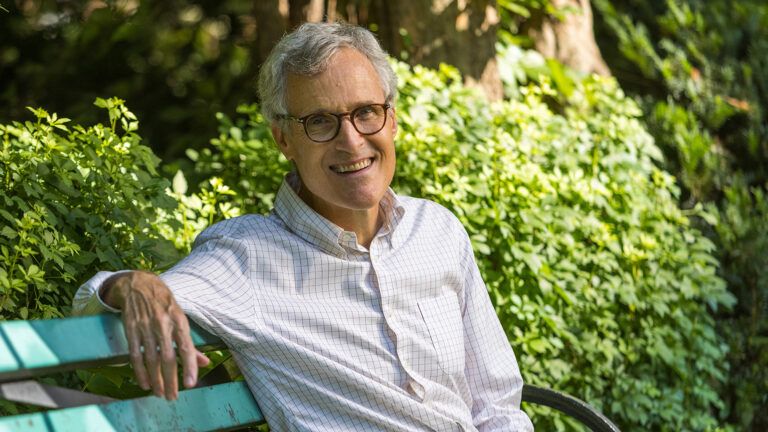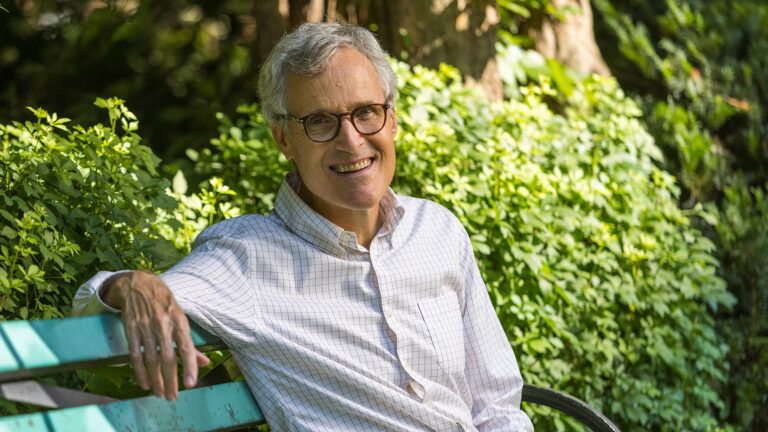I was driving to my parents’ house, and I was nervous. The reason was right behind me, nestled in a car seat. My adopted baby son Matthew had come home with us just a few days before. Now we were taking him to meet his grandparents.
He was eight months old, with a shock of feathery black hair sticking straight up. The hair was the giveaway. Matthew was a beautiful boy. But he didn’t look a thing like my husband, David, or me. Both of us were southerners, born and bred. Matthew was from Korea. That was the problem.
My father, Sonny, had been an Army sergeant in the Korean War. What exactly that meant, I never quite knew. It was something involving a medical unit, something about unloading wounded men from helicopters and preparing them for the doctors. I didn’t know because he never talked about it.
He would answer whatever question I put to him, but only that question, and with as few words as possible, speaking barely above a whisper, averting his eyes. He’d worked as a house builder after returning from the war, then as a land developer. He was a stoic man, never cried, and I probably saw his emotions mostly when he played guitar, which he did beautifully.
The war came right up, though, when I told my mom we planned to adopt Matthew. She called me a short time later. “Teri,” she said, sounding apprehensive, “I don’t want to worry you, but I thought you should know.
When I mentioned to your father that Matthew is Korean, he got a little upset.” I was quiet. She went on. “Now, I calmed him down, but he was saying things like, ‘I had to fight those people. They killed a lot of my friends.’ I told him that was a long time ago, but, well, I thought you should know."
The drive to my parents’ house was 90 minutes from the small country town where David worked as a Methodist minister. I spent every one of those minutes thinking hard and praying.
Matthew was like a sudden and unexpected gift dropping into our lives. I have a disease called lupus, which makes it dangerous to conceive a baby. For a while I was reconciled to that. I earned my music degree in college and led a high school choir, and David and I had our hands full with the church.
Not until my mid-30s did I begin to feel something was missing. We tried a state adoption agency, but everything about it—the paperwork, home inspections, background checks, the number of people ahead of us on the list—suggested we’d never get a baby. An international agency told us basically the same thing.|
And yet, a year later, both agencies called out of the blue with offers of baby boys. Christian came first, from the state agency. He was deaf and mute, and we accepted him immediately, and loved him.
The international agency called three months later. “We have a boy from Korea,” they said. “His biological mother is schizophrenic, so we’re having trouble placing him. Will you take him?” They didn’t say so outright, but I sensed that Matthew might go to an orphanage if I didn’t say yes. I answered with barely a thought.
God, please make that the right decision, I prayed as David cut the engine on my parents’ drive. We unbuckled the boys, and my mom appeared at the door, gasping with delight at Matthew’s alert, curious face.
Inside, I saw my dad in his favorite chair, an ancient maroon recliner worn bare on the armrests. He didn’t look particularly pleased. I decided to get it over with right away. “Daddy, I want you to meet your new grandson,” I said, handing Matthew to him. I don’t know what I was expecting, but all that came was silence. A long, deep silence, maybe 30 seconds.
And then Matthew made a noise, a little gurgle, and bunched up his face. Dad smiled, and I heard him chuckle. Matthew chuckled back. Dad’s smile widened. He laughed again, and before I knew it the two were laughing at each other, Dad making faces and Matthew waving his arms like he couldn’t contain himself. I felt my whole body relax. Dad looked up, his sky-blue eyes wide in his pale, drawn face. “He looks like a good boy, Teri.”
From that day forward, Matthew and my dad became inseparable. David enrolled in a seminary and days he was gone, I’d drive the boys to my parents’. Dad played guitar and sang with them, read to them and sat them on his lap in the maroon chair to watch television. He loved them equally, but I could tell he was especially taken with Matthew. He’d watch him intently or gather him into his arms with a big “oomph!”—like the war had never been an issue.
Years went by. The boys entered school and seemed to do fine until, in first grade, Matthew began coming home troubled. “Mom,” he asked one day, “am I American?”
“Of course you are, sweetheart,” I replied. “What makes you ask that?”
“Kids at school say I’m not. They say I’m Korean and I look funny, and America beat Korea in a war and I should go home.” I tried reassuring Matthew, but he kept bringing it up, especially the part about the war.
One day I was in my parents’ kitchen, when suddenly I froze. A little voice floated in from the living room, where Matthew was playing with his grandfather on the maroon chair.
“Poppy,” Matthew said, “why did Americans fight Koreans? What did the Koreans do wrong?”
The house went silent. I stood at the counter, unable to collect my wits. Before I could move, my dad’s voice sounded. “Matthew,” he said slowly and gently, “that’s not quite the right way to put it, son. The Koreans didn’t do anything wrong, especially the South Koreans, where you come from. The North Koreans were trying to take them over. So the Americans came to help. And the South Koreans fought too. They were very brave. I know, because I was there.”
I could hardly believe it. It was more words about the war than I had ever heard my father speak. Matthew wasn’t satisfied, though. He had more questions, many more. They poured out. And my father answered every one. Finally, Matthew changed the subject then ran outside to play. I peered into the living room. My father’s head was leaning against the back of the chair. He looked tired. Better make sure that doesn’t happen again, I thought.
But it did happen, every time we went to my parents’. The minute we walked in the door, Matthew was on his grandfather’s lap, asking about the war. Dad was good about it, but finally I had to act. While the kids were outside one day, I blurted out an offer to make Matthew stop.
Dad looked at me a minute, puzzled. “Stop?” he said. “Heavens, Teri, don’t do that. I don’t mind at all. In fact—” He put a hand to his face. “Do you know, until he started asking me those questions, I don’t think I’d ever figured out why I was there. Why so many of my friends died. But, Teri, I know now. I was there for him.” He stopped, and I thought maybe he would cry. But he composed himself, and I sensed that was all he wanted to say.
With Matthew, though, he couldn’t stop talking. History, especially Korean War history, became their bond. I bought Matthew books and videos about it, and he and my dad read or watched them together.
I stopped tensing every time the subject came up. I’d sit in my parents’ living room, reading the paper, while Christian played with his toys and Dad and Matthew chattered away about some battle.
One day—it was Memorial Day, actually, and our whole extended family was at my parents’ house—I was doing just that when I heard Dad say something like, “It brought me you.” I looked over. Matthew was facing my dad, knees straddling his lap. Suddenly his little brown hands flew up to my dad’s pale cheeks. “Poppy,” he declared, “you’re my hero!”
There was more silence, and I realized my dad’s face was quivering. A tear appeared at the corner of one eye and rolled down his cheek, landing on his shirt. Soon he was crying harder than I’d ever seen. He held Matthew in his arms, rocking back and forth, until the tears stopped and his eyes simply closed.
Dad died last year and was buried as a veteran, with a flag draping his casket. At the funeral, the boys put their hands on his chest to make sure he’d really stopped breathing. I told them he was in heaven.
They’re back to their old selves now, though one thing is different about Matthew. He never talks about the Korean War. And he stopped asking if he was an American. I want to tell Dad, of course, share this new side of Matthew with him. But I think he knows. Maybe he always knew, from that moment they met. They both had so many questions. And there, in that old maroon chair, they found the answers. We all did.





